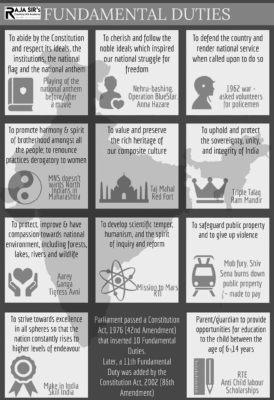- Home
- Prelims
- Mains
- Current Affairs
- Study Materials
- Test Series
All clamour for rights, nothing on fundamental duties
The Supreme Court on 21 February 2022 issued notices to the Centre and states in a writ petition seeking the enforcement of the fundamental duties of citizens as enshrined in the Constitution of India. The petition, filed by advocate Durga Dutt, argues that citizens have a duty to uphold the ideals of the country and to contribute to its growth and betterment, and that not carrying out the fundamental duties of the citizen has a direct bearing on the fundamental rights guaranteed under Articles 14, 19 and 21 of the Constitution.
“The Fundamental Duties are intended to serve as a constant reminder to every citizen that while the Constitution conferred on them certain Fundamental Rights specifically, it also requires citizens to observe certain basic norms of democratic conduct and democratic behaviour because rights and duties are correlative… There have been cases where Fundamental Duties have been brazenly flouted by the people including the officers of the law and which in turn resulted in violation of Fundamental rights of other citizens,” the petition argued. The issue of fundamental duties crops up periodically in public discourse.
In his Constitution Day address to a Joint Session of Parliament in 2019, Prime Minister Narendra Modi stressed the importance of constitutional duties, while President Ram Nath stressed the difference between rights and duties, and Vice President M Venkaiah Naidu called for fundamental duties to be included in the school curriculum and for a list of the duties to be displayed at educational institutions and other public places. Then Union Law Minister Ravi Shankar Prasad, wrote in The Indian Express, calling for citizens to remember their fundamental duties just as they remembered their fundamental rights.
How were the fundamental duties incorporated in the Constitution?
The fundamental duties were incorporated in Part IV-A of the Constitution by The Constitution (42nd Amendment) Act, 1976, during Indira Gandhi’s Emergency. Article 51(A) describes 11 fundamental duties — 10 came with the 42nd Amendment; the 11th was added by the 86th Amendment in 2002, when Atal Bihari Vajpayee was Prime Minister. These duties are not enforceable by law. However, a court may take them into account while adjudicating on a matter. They were made a part of the Constitution to emphasise the obligation of the citizen in return for the fundamental rights that he or she enjoys. The Russian Constitution has the concept of fundamental duties.
 What are the fundamental duties of the citizen?
What are the fundamental duties of the citizen?
Article 51(A) says it shall be the duty of every citizen of India:
“(a) to abide by the Constitution and respect its ideals and institutions, the National Flag and the National Anthem;
(b) to cherish and follow the noble ideals which inspired our national struggle for freedom;
(c) to uphold and protect the sovereignty, unity and integrity of India;
(d) to defend the country and render national service when called upon to do so;
(e) to promote harmony and the spirit of common brotherhood amongst all the people of India transcending religious, linguistic and regional or sectional diversities; to renounce practices derogatory to the dignity of women;
(f) to value and preserve the rich heritage of our composite culture;
(g) to protect and improve the natural environment including forests, lakes, rivers and wild life, and to have compassion for living creatures;
(h) to develop the scientific temper, humanism and the spirit of inquiry and reform;
(i) to safeguard public property and to abjure violence;
(j) to strive towards excellence in all spheres of individual and collective activity so that the nation constantly rises to higher levels of endeavour and achievement;
(k) who is a parent or guardian to provide opportunities for education to his child or, as the case may be, ward between the age of six and fourteen years.”
The last subsection, (k), on the education of children, was added in 2002 by The Constitution (86th Amendment) Act. The same amendment also introduced Article 21A in the Constitution: “The State shall provide free and compulsory education to all children of the age of six to fourteen years in such manner as the State may, by law, determine.”









 Latest News
Latest News
 General Studies
General Studies